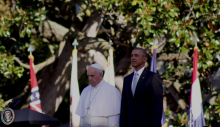Progress

From President Obama, I have learned to be an activist, to fight for change, and to believe that change is possible even on the darkest days. I have learned to cry out against injustice and name the evils in this world for what they are, to speak bold truth about what I believe is right even when it feels dangerous.

Stunning is the word that most comes to me after Pope Francis’ two-day visit to Washington, D.C. The country and the media was reveling in his presence, using language like “amazing,” “incredible,” and “wonderful” in response to this extraordinary moral leader who literally transformed our public discourse in the 48 hours he was in the nation’s capital. What these two extraordinary days mean going forward is the big question on all our hearts and minds.
At the formal welcoming ceremony on the South Lawn at the White House, a very traditional template was transformed by the “Vicar of Christ,” whose presence turned everyone’s language to one reference after another to those Christ called “the least of these” in the 25th chapter of Matthew. Never have I heard the most vulnerable being the most talked about in this city.
President Obama began the pope’s visit with these words, “What a beautiful day the Lord has made.”
Indeed. Then Pope Francis introduced himself to America as “a son of an immigrant family” who was “happy to be a guest in this country, which was largely built by such families.”
Point made.

Religion is notoriously behind on nearly every societal curve there’s ever been. Some say that’s a good thing, as it’s supposed to be countercultural.
But there’s a difference between pandering to cultural trends and being tone-deaf or willfully ignorant. And as one of my old grade-school counselors once said: when you know better, do better.
If we look around us we know that there are better ways to employ the resources we have to affect positive social change, deepen discipleship, and strengthen community of many kinds. But we adhere to mid-twentieth-century models and understandings of how the world works, then look around, asking ourselves why no one cares anymore.
It’s time for Moneyball church.

The news of the PCUSA adopting the Marriage Amendment came to me over Twitter. Flowing down my feed were tweet after tweet of individuals applauding the latest Christian move toward inclusion (disclaimer: my feed is an echo chamber). Proud Presbyterians puffed up their chests and, hilariously, celebrated the christening of the new “Presbyqueerians” and “Lesbyterians,” and I was overwhelmed. Our church is in perpetual rehab, always growing into the person she is supposed to be and I am so proud of her latest progress. The Marriage Amendment, which affirmed the marriage of Christian same-sex couples , was not much of a surprise, given the progressive spirit of the PCUSA, but even still. It was only a week ago that the largest evangelical church in San Francisco also reformed its teaching on marriage. Three other evangelical megachurches preceded them in the last six months. And if rumors are true, more megas are coming out soon. Change is coursing through the air and knocking me over happy.
Immediately following the vote, some Southern Baptist conservatives also took to Twitter to express their harsh disapproval. Besides declaring that the PCUSA is now officially, by their definition, NOT Christian, they spoiled the often misidentified PCA (Presbyterian Church of America) with lots of love and praise for sticking to their arithmetic of “1 Man + 1 Woman = Marriage.”
I read an article by one of those enraged. He highlighted the key differences between the PCA and the PCUSA. The media had been mixing up the two, so he wrote it mostly to distinguish which one was still Christian, taking some extra digs at trending membership numbers and highlighting all the hot-button disagreements between the two. As I read it, I had to sigh a little, as I couldn’t help but hear the echoes of history reverberating beneath that piece, especially given the Presbyterian past.

There is no mistaking it: Shad Kabango's music is authentic and tenacious. With incredible humility, he speaks from his heart, with no fear of calling out the inconsistencies he sees in the world.
In the recent release of his 4th studio album, Flying Colours, the critically acclaimed Canadian emcee, better known as simply "Shad," hopes his music speaks for itself.
"It’s not easy to summarize or convey, I don’t think," Shad said of the theme of the album, in a recent interview with Sojourners. "Some sort of … feeling of hope, I guess, but hope within the complexity of real life and the challenges of real life."